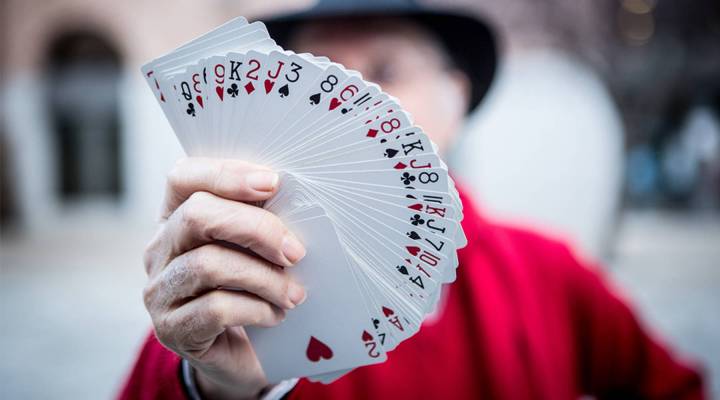
How the internet democratized the magic industry
Magic, one of America’s oldest pastimes and a multimillion-dollar industry, has been transformed by the digital age. With the tools of social media at their disposal, young magicians today have strong personal brands, cultivate large followings online and have more options than ever for monetizing their craft. Ian Frisch is a journalist and author who became so fascinated by magic’s underground subculture that he became a magician himself. His new book on magic’s transformation in the modern era is called “Magic Is Dead.” The following is an edited transcript of Frisch’s conversation with Marketplace host Kai Ryssdal.

Kai Ryssdal: So far be it for me to quibble with an author about the title of his book. But “Magic Is Dead,” based on my reading this book, seems not to be right, right? It’s just very much alive but different than I think what a lot of people think it is.
Ian Frisch: Yeah, I think maybe the magic world you knew to exist is quite dead or at least transformed quite dramatically. For a long time, you know, magic kind of operated like a monarchy. You know, if you were coming up in a scene you still had gatekeepers and kings to impress and people to kind of usher you up to these upper echelons. But now with social media, with the internet with the accessibility of information, it’s kind of transformed into a democracy. You know, people have their own voice and they have control over their own image.
Ryssdal: Of which you are a good example, right? Because you did not grow up as a kid saying, “Ooh, I want to be a magician,” right?
Frisch: No, definitely not. [I] never had a kiddie magic set. My mother was a poker player growing up, so, you know, we had a little bit of deception in our blood that way, but I really wasn’t into magic until 2015 when I stumbled upon Chris Ramsay, who’s a main character in my book, on Instagram, and I’m looking at this guy, and I hit a YouTube channel as well, and I’m checking him out. I’m like, “This dude does not look like a magician.” You know, he was wearing the latest street wear and he had a beard and a backwards hat and all these tattoos. The current crop of young magicians, they’re not only progressing the craft but also the brand of magician, which is what got me into this story in the first place, really.
Magician Chris Ramsay and “Magic Is Dead” author Ian Frisch.
Ryssdal: Yeah, well, we’ll get to how you got into it in a second, but I do want to talk about how magicians today — and you have become now one of them, or one of you, I suppose — you got to work at it, right? It’s social media. It’s individual branding. It’s all of that stuff that is in a way part of the digital age for really old, old craft.
Frisch: Right. To step back and kind of give us a sense about how this all kind of works is that magicians for a very long time they had kind of shared secrets behind the scenes through self-published books or just by word of mouth. But once the internet came into play as a tool that they could use, you had an explosion of entrepreneurship. People started developing online retail stores where you could develop magic tricks and then sell them, and that’s where I came into it in terms of creating an effect and selling it.
Ryssdal: In the lingo of industry, you guys went from a B2B enterprise, business to business enterprise, to a business to consumer enterprise. I mean, you invented a trick and you have a YouTube trailer for it, for crying out loud.
Frisch: Yeah, it’s quite interesting, you know, the whole setup of this, because I’ve reported on business, you know, as a working journalist. And I was really interested in how all these young magicians were not only using social media and the internet to kind of just put themselves out there, but they were creating these systems where these magic tricks or their new takes on an perhaps older effects could be disseminated and discovered by people who are maybe just getting into magic. There’s dozens of websites where everyday normal people can go online and, you know, pay 10, 15, 20 bucks and learn how to do magic tricks.
Ryssdal: Which democratizes it, and that, I suppose, is good for you all because it gets you out there, and it gets you a new market, as it were, but do you worry about losing the magic of magic?
Frisch: No, because I think the magic of magic is people continuing to dig into it from a practitioner’s perspective. You know, you can go online and you can use YouTube and learn. You know, I think magicians, although they guard their secrets, they really enjoy when people get into magic, and I think that’s why I was accepted into this world, because I showed such an intense and earnest curiosity for how this all works. I mean, aren’t magicians just born with these abilities? And you know, that’s not really the case, as you can tell from my journey in this kind of underground subculture.
Click here to read an excerpt from Frisch’s book, “Magic Is Dead.”
There’s a lot happening in the world. Through it all, Marketplace is here for you.
You rely on Marketplace to break down the world’s events and tell you how it affects you in a fact-based, approachable way. We rely on your financial support to keep making that possible.
Your donation today powers the independent journalism that you rely on. For just $5/month, you can help sustain Marketplace so we can keep reporting on the things that matter to you.


















